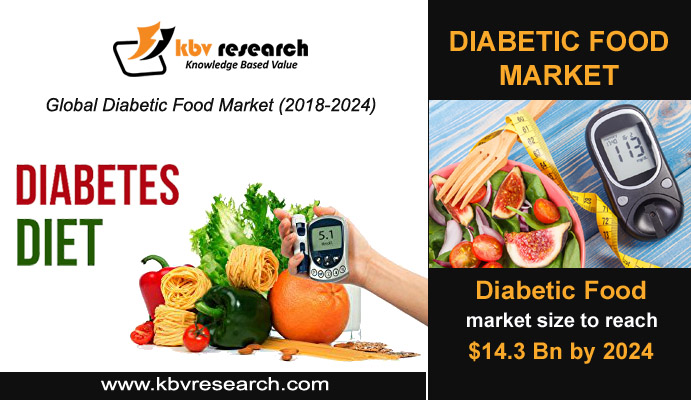
Health concerns associated with the geriatric population and the growing amount of high blood sugar levels have swayed the increased adoption of artificial sweeteners as a sugar substitute. According to one of the leading market research domains, KBV Research, this increased adoption would escalate the growth of the global market of Diabetic Food over the analysis period. The industry for diabetic food is expected to mount high up to $14 Billion worth with a budding CAGR of 5.6%.
The global rate of diabetic patients has risen alarmingly. Hence, there is a strong need for a diabetic diet for people with diabetes mellitus problems. The general recommendation includes intake of dietary fiber like soluble fiber. Diversely, saturated fat and sugar are eliminated completely out of the diet.
Diabetes is a long-term disease that takes place when pancreas doesn’t produce enough insulin or when the body cannot use insulin effectually. Insulin is a hormone which controls the blood sugar. High blood sugar is a common indication that can be caused by uncontrolled diabetes and over time it can cause severe damage to various systems of the body, specifically to the nerves and blood vessels. Adults suffering from diabetes have a high risk of heart attacks and strokes.
Following a well-balanced diet helps greatly in protecting the overall health of a person and reducing risks of other health conditions as well. Diabetic food can diminish the amount of inflammation in the body, upsurge good cholesterol, and reduce bad cholesterol. Additionally, a balanced diet with healthy resources of carbohydrates, fat, and lean protein has proven to effectively help the metabolic syndrome which can be considered as another possible cause of diabetes.
Studies show that the Mediterranean diet helps in lowering blood pressure and cholesterol levels along with decreasing waist circumference. Since this diet contains beneficial diabetic foods like healthy carbs and plenty of fresh products, this way of eating is as similar to any other recommended diet for diabetes.
People with type 1 and type 2 diabetes have to manage their blood sugar levels every day. Having diabetes makes people aware and cautious about everything they eat or drink. It is crucial to understand the number of carbohydrates consumed and the impact they make on a diabetic patient’s blood sugar. Zero or Lo-calorie beverages are usually the best for diabetic patients. Diabetic patients generally opt water in place of any other beverage. Unsweetened tea, skim milk, or natural juices are a good choice for patients with diabetes. To serve the sweet tooth of diabetic patients, various industries have come up with natural sweetener products like fragrant herbs, slices of citrus fruit, and crushed berries. Dietary beverages like sugar-free fruit juice and unsweetened tea or coffee can help a diabetic patient with avoiding unpleasant side effects, managing symptoms, and maintaining a healthy weight.
Click Here For Free Insights: https://www.kbvresearch.com/news/diabetic-food-market-size/
Studies have shown that people with the highest dairy consumption exhibit low risk of diabetes. The risk dropped down to nearly 40% lower in such people. Consuming dairy fats and determining the right quantity can be done with helpful screening tests. When bodies break up dairy fats, the fats form unique fatty acids called heptadecanoic acid, pentadecanoic acid, and trans-palmitoleic acid. Consumption of dairy products is accompanied by health benefits, especially for diabetic patients. For instance, a relatively low-fat dairy product like cheese may reduce the possible risk for diabetes.
Evidently, nutrition principles and recommendations for treating diabetes have been developed and implemented within various developed countries. From diabetic confectioners to low-fat dairy products, diabetic food manufacturers are now offering a wide variety of products that are chiefly propelling the market forward. Whether an exclusive food business or any former soft drinks body, the growing awareness about diabetes is inspiring business owners in producing innovative sugar-free food products along with matching its texture and flavor with regular food products. Additionally, manufacturers are introducing new dimensions to the market of diabetic foods by scaling their choice of low-calorie or zero-calorie beverages. Firms are promoting beverages that are extracted from naturally available substitutes of sugar that taste like sugar cane but are minimally harmful.